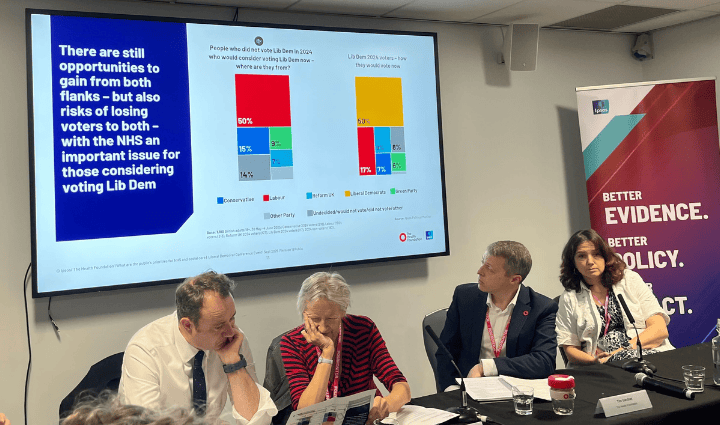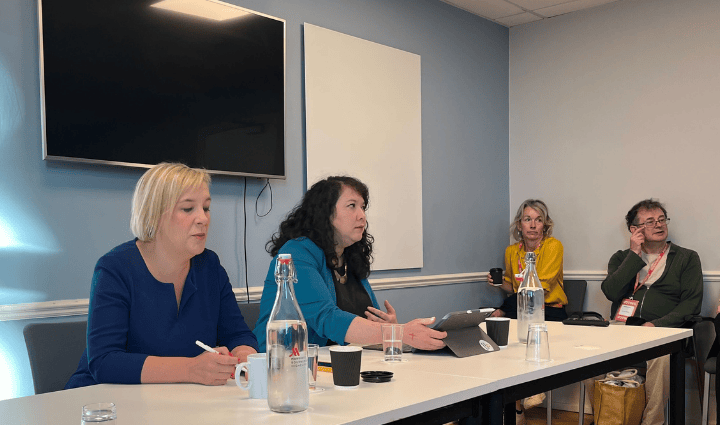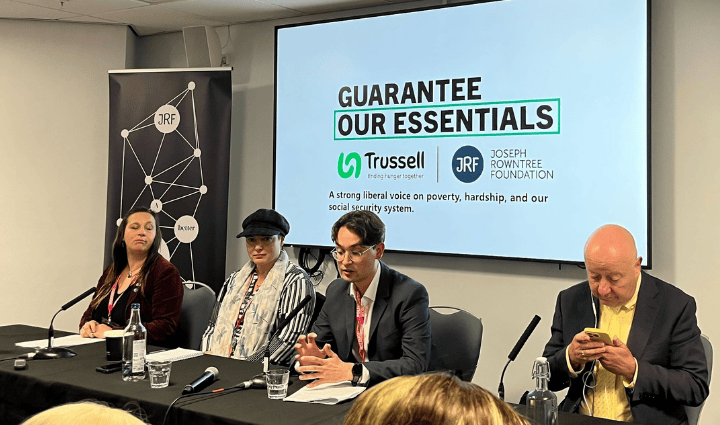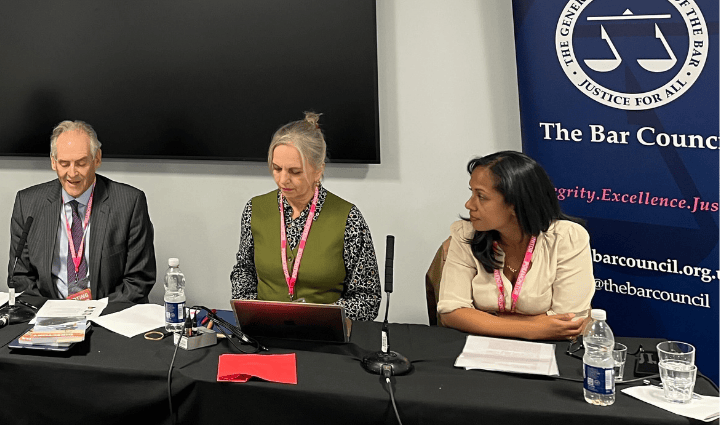Lib Dem party conference 2025: promising foundations to support migrant workers and their families
Fresh off the back of their best general election result ever, the Liberal Democrats were in a buoyant mood heading into their autumn conference. We joined the new array of MPs on the Bournemouth seaside, ready to raise awareness of the issues facing migrants and vulnerable workers in the economy.
As we head into what could be a crucial set of months for the current government, we reflect on the conference, where the Liberal Democrats stand on key issues and what might be next for the party.
Immigration: the word on everyone’s lips
Though there were relatively few events specifically focused on issues around immigration over the conference weekend, it was hard to ignore the salience of immigration connecting many debates. The party used the conference as a platform to announce their policy of treating asylum processing as a national emergency, promising to set up Nightingale processing centres, doubling the number of asylum caseworkers and getting rid of the existing backlog within six months.
In a Q&A session with Home Affairs spokesperson Lisa Smart MP and Lord Mike German, there was emphasis placed on the need to issue accurate asylum decisions first time around, to prevent unnecessary appeals. Lisa Smart also mentioned that it was a long-standing policy of the Liberal Democrats to help lift the existing ban on asylum seekers working in the UK if people have been waiting longer than three months for a decision.
This would allow them to support themselves and prevent homelessness once a decision on refugee status was made. Other topics referenced in the Q&A included the Liberal Democrats’ opposition to the government’s ending of international recruitment in social care, and the need for safe and legal routes for those seeking asylum in the UK.

British Future session: How can Liberals win the argument on immigration. Left to right: Frank Sharry, Sunder Katwala, Lisa Smart MP, Lord Mark Pack
Our Research Officer, Andrei Savitski, asked about what the Liberal Democrat position was on worker exploitation under the sponsorship system, which drew much applause from the packed room. Lord German agreed that many workers in different sectors like agriculture and domestic workers were being punished by the existing system, particularly if they attempted to leave exploitative work situations. He said that workers must have the flexibility to move and change employment freely so that workers are not exploited in the future, a call which we very much welcome.
Mid-way through the conference, Liberal Democrat MPs were having to react in real time to proposed plans by the Reform party to revoke indefinite leave to remain status for migrants in the UK, forcing them instead onto a restrictive renewable visa with limited access to social security. In short, the conference crowd expressed a mixture of shock, disbelief and anger at the proposals, with a clear agreement on the need to tackle this narrative.
At a later session held by British Future, Lisa Smart and Lord Mark Pack highlighted the need to counter the policies of Reform by engaging with voters directly on these issues. Lord Pack argued that the public’s disproportionate focus on small boat arrivals presented both a challenge and opportunity, and that if the Liberal Democrats could get their strategy right, they could emerge as the most trusted party on immigration. Frank Sharry, a leading migration expert from the US reflected on similar challenges related to migration currently being experienced across the Atlantic.
Overall, what limited coverage of migration there was focused heavily on refugee and asylum policy, as opposed to legal migration and issues of worker exploitation. This is, unfortunately, a sign of the times.
Health and social care remain a core part of the Lib Dem strategy
An area for greater optimism from the Liberal Democrats was their continued focus on health and social care reform. At an event held by the Health Foundation and IPSOS, Dr. Danny Chambers MP spoke about how the Liberal Democrats need to do better to improve the public understanding of health and social care (in particular), and to sophisticate party strategy to get more media cut-through on these issues.
He was critical about the lack of action that the Labour government had taken in relation to social care, which hadn’t featured in key health-related outputs from this government like the NHS 10-year plan. Dr Chambers welcomed recent cross-party talks on social care, and that without cross-party consensus, there was a risk that social care reform either wouldn’t happen or survive successive governments.

Session on the public’s priorities for the NHS and social care, hosted by Health Foundation and IPSOS. Dr Danny Chambers MP; Jill Rutter, Senior Research Fellow of UK in a Changing Europe; Tim Gardner, Assistant Director of Policy at the Health Foundation; Polly Mackenzie, How to Win an Election podcast host
Prompted by a question from our Policy Manager, Adis Sehic, Dr Chambers said that the government’s decision to end international recruitment in social care was an example of how politics was moving away from evidence-based policymaking to decisions being ideologically driven.
He called the government’s approach not pragmatic, shortsighted and similar to the restrictions that had been put in place for overseas students, which were having a negative effect on the coffers of British universities. Dr Chambers reaffirmed the Liberal Democrats’ plan for an increased minimum wage specifically for carers, a national care service and professionalising the workforce through a national institute for carers.
In the works: digital IDs, social security and justice reform
An engaging session on Sunday focused on Digital ID policy was packed with members and MPs. Just a day before, media outlets were reporting that the Labour government was planning to announce the launch of digital ID cards in the UK, in a bid to tackle so-called illegal migration. The reports suggested that digital ID cards would most likely be used to check people’s right-to-work status and eligibility for rental agreements.

Digital ID policy with Lisa Smart MP, Home Affairs Spokesperson, and Victoria Collins MP, Science, Innovation and Technology Spokesperson
Our Policy Manager, Adis Sehic, highlighted issues with the Home Office’s existing transition to digital e-visas, both for EU nationals and more recently for other categories of visa holders. As has been well documented, the Home Office’s e-visa system has been subject to technical glitches and issues, leaving a number of individuals without the ability to prove their right to rent or work in the UK. We also know that in some instances issues with the e-visa system have had serious impacts on the ability of migrants to travel overseas freely and without issue.
On social security, our team attended a Joseph Rowntree Foundation and Trussell event on poverty and hardship. Helen Barnard, an expert from Trussel, opened the session with some shocking statistics, including that around 14.1million people (1 in 6 households) faced hunger last year, up from 11.6million in 2022. She described how poverty is being driven onto three core groups: disabled individuals, carers, and families with children. The two-child benefit cap was identified as the single biggest driver of poverty for children.

A strong liberal voice on poverty, hardship, and our social security system, hosted by The Joseph Rowntree Foundation and The Trussell Trust. Left to right: Amy, speaker with lived experience; Helen Barnard, Director of Policy, Research and Impact at the Trussell Trust; Steve Darling MP
Responding to questions, Helen listed her three priorities for government: an independent body that sets the level of benefits in a way that is linked to the actual cost of everyday essential goods; a minimum income floor; and dealing with the issue of Local Housing Allowance rates being yet again frozen by this Labour government, having initially been uprated.
Responding to a question from our Policy Manager, Adis Sehic on the No Recourse to Public Funds (NRPF) policy,Steve Darling MP said that although he hadn’t been as exposed to this issue previously, he believes it is another example of a policy that bakes in poverty from the start.
Helen responded that NRPF should not get mixed up with immigration policy. She argued that destitution is morally wrong and ultimately a burden on local authorities, and this should be a separate discussion to those around immigration policy objectives. Helen also pointed to the fact that migrants, who are often working and face similar life challenges to those individuals not subject to NRPF, ultimately do not have the same safety net available, which could be seen as fundamentally unjust.
At an event focusing on justice, the Liberal Democrat shadow attorney general, Ben Maguire MP, spoke about how access to justice should be seen on the same footing as other public services including healthcare. He mentioned that current cuts to legal aid and the backlogs in courts were leading to a two-tier system of justice, where those who can afford fees for legal representation are able to get advice but those who can’t do not get advice and representation.
He announced that he was bringing a motion to conference that would affirm a right to affordable legal assistance, establish “Lawstart” centres in places of convenience for the public as a gateway to legal representation and create a workforce plan for duty solicitors.

Access to justice, rebuilding trust in a key public service, hosted by The Bar Council. Left to right: Lord Marks; Kirsty Brimelow KC, Doughty Street Chambers; Rohini Jana, Legal Aid Practitioners Group
Looking ahead to the next election
The Liberal Democrats will be hoping that the strategy that led them to record success last year will also bring rewards at the next local elections taking place in May 2026. There could also be a step change, with recent polling indicating that the public want to see the Liberal Democrats step up with a more serious policy programme.
Given the Labour government’s huge majority in the House of Commons, it will be difficult for the party to properly effect the change it wants to see beyond more detailed opposition and scrutiny. But for now, at least, the party is holding firm on its manifesto commitments which were generally supportive of the rights and protections of migrant workers and their families.
Read more of our policy analysis here
